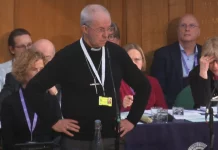Remember the “two drifters off to see the world” as in Audrey Hepburn’s ‘Moon River’ song from Breakfast at Tiffany’s? Jay Austin and Lauren Geoghegan, both 29, quit their jobs and bicycled off to see the world. Suckered by the Goldilocks fairy tale of liberalism they rejected the narrative of evil.
While pumping the pedals, Austin paused to pontificate on his blog: “People, the narrative goes, are not to be trusted. People are bad. People are evil. People are axe murderers and monsters and worse.” Austin trumpeted how “no greater revelation has come from our journey” than the discovery that “humans are kind.”
“Evil is a make-believe concept we’ve invented to deal with the complexities of fellow humans holding values and beliefs and perspectives different than our own,” he sermonised. Soon after, in the Shangri-La of Tajikistan, he and his flower-power companions met the wicked witch from the Brothers Grimm. Two ISIS terrorists, overflowing with the milk of global goodness, rammed them with a car, then stabbed and shot them.
As with our two drifters imagining the world to be like the Garden of Eden before the Fall, evil is a verboten word for the well meaning but notably naïve ninnes who roost in the House of Bishops. Not a whisper of condemnation has passed their episcopal lips when horrendous evils are being perpetrated against the most vulnerable in this land.
Name one bishop who has stood against the genocide of abortion, which at the current figure of 9million far surpasses the Holocaust? Has a single bishop said a word against the industrial-scale rape of white underage and under class girls by Muslim Pakistani men? Could you dream of a woman bishop flying like Mary Poppins to help girls who have their clitoris chopped off? While Bishop Philip Mounstephen of Truro scribbles his Independent Review of globally persecuted Christians, is he independent enough to raise a stink over a local black man who was arrested in London simply for preaching the Bible?
The silence of our shepherds on the slaughter of our most vulnerable lambs, reminds me of John Cage’s kooky composition 4’33” in three movements. It is four minutes and thirty-three seconds long and is written for any instrument or combination of instruments. The score instructs the performer(s) not to play their instrument(s) during the entire duration of the piece!
But this symphony of silence suddenly erupts into a fortissimo of ear-shattering outrage when Britain refuses to open its doors to the traitorous ISIS jihadi-bride Shamima Begum. Now, its Mahler gone mad with bishops banging cymbals, blowing trombones and jumping up and down like giant tadpoles on timpani.
Stephen Cottrell, Bishop of Chelmsford, leads the rampage of pious pachyderms calling the government’s intention to strip Shamima Begum of her citizenship “morally reprehensible.” Wearing his bleeding heart on his media sleeve, Cottrell pleads for Begum’s “child and its future.” Cottrell admits ISIS has “caused havoc, horror and misery” but “we do not help the situation by failing to act with decency ourselves.”

Alan Smith, Bishop of St Albans, drones on about the “Christian responsibility to protect the vulnerable.” He can’t make up his mind if Begum is “still a vulnerable person” but her baby qualifies for the status, he says. Bishop of Chester, Peter Foster, thumps his pulpit summoning the government to amend the law.
Martin Warner, Bishop of Chichester, who knotted himself more intricately than a Turkish rug by refusing to acknowledge Bishop George Bell was “innocent” of child abuse, is fretting over how Begum’s banishment will affect “community relations.” He’s losing sleep over “the most vulnerable person in this whole situation” as the baby will have to face “lifelong” consequences.
Cottrell quotes Psalm 85: “Mercy and truth are met together; righteousness and peace have kissed each other.” He might want to play Bible Bingo and reverse the numbers to Psalm 58: “The wicked are estranged from the womb; they go astray from birth, speaking lies. They have venom like the venom of a serpent, like the deaf adder that stops its ear. O God, break the teeth in their mouths; tear out the fangs of the young lions, O Lord!
In a twist of delectable irony, our Muslim Home Secretary Sajid Javid, Begum’s Muslim neighbours in Bethnal Green, Muslim leaders and Shamima’s own father all disagree with the bishops. Ahmed Ali, the father said he was shocked by his daughter’s lack of remorse and “she doesn’t deserve to come back to Britain.” He’s now done a flip-flop, perhaps intending to convert to woolly Anglicanism?
Meanwhile, more home-grown jihadis are pounding at the doors of welfare state Britain. Jack Letts, aka ‘Jihadi Jack’ wants to return to England because he misses pasties, Dr Who and his mum. Maybe Justin Welby should plead his case, eh?
If only our bishops would stop fighting the bogeymen of progressive mythology like global warming and transphobia and Islamophobia and the gender pay gap and would put down their copies of the Guardianand pick up a copy of Islamic State’s magazine Rumiyah, they might just wake from their Rip Van Winkle slumber and recognise that a revolution has changed the face of Britain.
Rumiyah follows Dabiq, ISIS’s earlier publication. I’ve got a folder on my Mac with every single issue of both publications, if Lambeth Palace is interested. Rumiyah is published in English, German, French, Russian, Turkish, Uyghur, Pashto, and Bahasa Indonesia and is targeted at an international audience.
Rumiyah, is the Arabic name for Rome. It symbolises Islamic State’s conquest of the “Roman Empire” (i.e. the Christian West). Dabiq, as I explained in my Frontpage Mag column, is a town in northern Syria, where the great battle between the forces of good and evil will be fought, according to Islamic prophecy.

Although the narrative of radicalisation is consistent, we see a stunning shift in emphasis from Dabiq to Rumiyah. While Dabiq calls jihadis to emigrate to the Caliphate, in Rumiyah the warriors of Islam are asked to return and carry out terrorist attacks in the home country.
The series ‘Just Terror Tactics,’ which details exact procedures for attacks series appears in five of 13 of Rumiyah issues and lists places like parades, shopping malls and trade fairs as ideal for terrorism.Rumiyah suggests individuals use low-cost assault tactics with Molotov Cocktails, knife attacks, or driving cars or trucks into crowds. Articles citing religious texts encourage jihadis to kill all Christians and apostates of Islam.
“Journeying to the Caliphate is no longer the primary objective of radicalisation. In Rumiyah, young people are being asked to relocate the battle to their home countries, which we associate with the territorial losses of the IS,” concludes a study of the above articles in the Journal of Deradicalisation. This is mainly because ISIS is losing large areas of its former territories in Iraq and Syria and showing signs of structural disintegration.
Is this why Shamima Begum, Jihadi Jack and hundreds of other jihadis are seeking return to Britain, France, the US and other Western countries? The evidence will not turn the bishops from virtue signalling and inadvertently abetting the jihadis of Islamic State. Even if they did, they would have no language to address the phenomenon of evil that is unparalleled in recent times.
Ruth Grant describes the paradoxical situation we face in the postmodern West: “A gulf has opened up in our culture between the visibility of evil and the intellectual resources available for coping with it. Never before have images of horror been so widely disseminated and so appalling—from organised death camps to children starving in famines that might have been averted . . . The repertoire of evil has never been richer. Yet never have our responses been so weak. The repertoire of evil has never been richer. Yet never have our responses been so weak.”
The problem is that our progressive bishops have fallen prey to Jean-Jacques Rousseau’s pivotal argument that human beings are born good and evil is the product of systemic forces. That’s why they speak of jihadi-brides as vulnerable victims who were groomed. They are closet Pelegians who believe humans have the capacity to act virtuously and secure salvation through their own efforts and so they dare not use the heavy artillery of moral condemnation lest they be judged as judgemental.
Will the bishops say that jihadis like Begum, who got her kicks from gawking at severed heads in Syrian trash bins, are evil? Or will they use the language of moralistic therapeutic deism and like clinical psychologist Simon Baron-Cohen “explore how people can treat each other cruelly not with reference to the concept of evil, but with reference to the concept of empathy”?
Shamima Begum, our bishops would say, is suffering from “empathy erosion.” And our bishops, we would say, are suffering from a complicated case of the erosion of moral clarity and terminal snowflakitis. Might cure them if they hopped on two wheels and cycled around Syria on a magical mystery tour, no?
(Originally published in Republic Standard)










